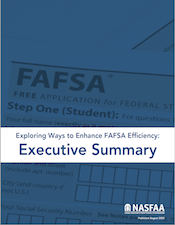Exploring Ways to Enhance FAFSA Efficiency Paper Series
 In summer 2019, NASFAA received grant funding to commission a 10-paper series exploring ways to make the Free Application for Federal Student Aid (FAFSA), and the overall federal student aid process, more efficient and streamlined for applicants and their families. NASFAA, using funding provided by the Bill & Melinda Gates Foundation, updated its 2015 FAFSA simplification proposal and enlisted other subject-matter experts to both assess the current validity of previous work done on FAFSA efficiency and explore new simplification concepts.
In summer 2019, NASFAA received grant funding to commission a 10-paper series exploring ways to make the Free Application for Federal Student Aid (FAFSA), and the overall federal student aid process, more efficient and streamlined for applicants and their families. NASFAA, using funding provided by the Bill & Melinda Gates Foundation, updated its 2015 FAFSA simplification proposal and enlisted other subject-matter experts to both assess the current validity of previous work done on FAFSA efficiency and explore new simplification concepts.
NASFAA reviewed the recommendations and ideas presented in each of these papers to determine which to support and incorporate into its own official FAFSA recommendations, which were then approved by NASFAA's Board of Directors. NASFAA based the 13 recommendations in its executive summary on recommendations from the individual papers that specifically aligned with NASFAA's policy and advocacy work. Follow along with the conversation related to these papers on social media using #FixFAFSA.
NASFAA's Executive Summary | Project Highlights Two-Pager | Press Release
We encourage readers to read the individually authored papers to learn more about each paper's topic and the recommendations of its authors. The recommendations contained in NASFAA's executive summary do not reflect all of the views expressed in all of the papers in this series.
Paper #1: Analyzing a One-Time FAFSA
Ben Miller
Center for American Progress
Paper #2: FAFSA and the Free College Movement
Jen Mishory, Anthony Walsh, Peter Granville
The Century Foundation
Paper #3: Using Public Benefits to Reduce Paperwork and Maximize Financial Aid
Lauren Walizer and Elizabeth Lower-Basch
Center for Law and Social Policy (CLASP)
Paper #4: A Stumbling Block on the Road to College: How FAFSA Verification Hinders Low-Income Students
Meghan Oster and Mark Wiederspan, Iowa College Aid
Stephen DesJardins, University of Michigan
Paper #5: Examining the Distribution of Negative Expected Family Contributions
Robert Kelchen
Seton Hall University
Paper #6: Exploring the Relationship Between FAFSA Verification and Pell Grant Award Change
Raymond AlQaisi, Bill DeBaun, Carrie Warick
National College Attainment Network
Paper #7: 2020 FAFSA Simplification Proposal Update
NASFAA
Paper #8: Understanding the Impact of Different Methods for FAFSA Simplification
Sandy Baum
Urban Institute
Paper #9: Applying for Student Aid: Can Federal Tax Returns Take the Place of the FAFSA?
Kim Rueben, Erin Huffer, and Sandy Baum
Urban Institute
Paper #10: The Federal Methodology: Is It a Good Measure of Ability to Contribute Toward Educational Expenses?
Sandy Baum
Urban Institute
— — —
NASFAA's partners on this project included individuals from leading higher education organizations and think tanks across the United States, as well as practitioners and prominent subject-matter experts.
 |
 |
 |
 |
Publication Date: 8/5/2020



